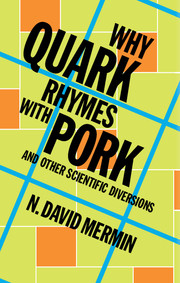Book contents
- Frontmatter
- Dedication
- Contents
- Preface
- Part One Reference Frame Columns, Physics Today 1988–2009
- Part Two Shedding Bad Habits
- Part Three More from Professor Mozart
- Part Four More to be Said
- 36 The complete diary of a Nobel guest, unpublished, 1996
- 37 Elegance in physics, unpublished lecture, Minneapolis, 1999
- 38 Questions for 2105, unpublished lecture, Zurich, 2005
- Part Five Some People I've Known
- Part Six Summing it Up
- Index
38 - Questions for 2105, unpublished lecture, Zurich, 2005
from Part Four - More to be Said
Published online by Cambridge University Press: 05 January 2016
- Frontmatter
- Dedication
- Contents
- Preface
- Part One Reference Frame Columns, Physics Today 1988–2009
- Part Two Shedding Bad Habits
- Part Three More from Professor Mozart
- Part Four More to be Said
- 36 The complete diary of a Nobel guest, unpublished, 1996
- 37 Elegance in physics, unpublished lecture, Minneapolis, 1999
- 38 Questions for 2105, unpublished lecture, Zurich, 2005
- Part Five Some People I've Known
- Part Six Summing it Up
- Index
Summary
I've been asked to talk about questions I would ask physicists 200 years after Einstein's annus mirabilis, if I could be magically transported to the year 2105. Why me? Because five years ago the New York Times had an article about ten questions physicists would like to ask their colleagues in the year 2100. Most of those questions made me uncomfortable. They seemed temporally provincial—too absorbed with issues of the current decade or two. Consider, for example, question 4:
4. Is nature supersymmetric and, if so, how is supersymmetry broken? and question 7:
7. What are the fundamental degrees of freedom of M-theory and does the theory describe nature? It would surprise and disappoint me if the context and terms of such questions made sense to anybody but historians of science, after the passage of 100 years of research. The only question of the ten that struck me as reasonable was
1. Are the dimensionless parameters that characterize the physical universe calculable in principle, or are some merely determined by historical or quantum-mechanical accident, and uncalculable?
Dimensionless parameters are likely to survive all but the most radical upheavals in our conception of the world. Indeed, the concept has been with us at least since the hydrodynamicists of the 19th century, and though fundamental constants are a 20th-century invention, they have been with us now for the better part of a century. This question, alone among the ten, satisfies all the criteria I'll describe later.
I felt uncomfortable not only with most of the questions, but with the whole exercise. Too many unimaginable things can happen in a century to render our current concerns irrelevant or obsolete. Just think about how physics changed in the century behind us.
I write an occasional column in Physics Today, commenting on various peculiarities of our profession, and the pitfalls of devising questions for colleagues 100 years from now struck me as a good topic. So in February 2001 I published an essay inspired by the article in the New York Times, giving my own list of ten questions, designed to highlight the futility of the whole exercise.
To set the stage for making inquiries a century into the future, one cannot do better than to recall the tale of Enoch Soames, as told by Max Beerbohm, in 1897.
- Type
- Chapter
- Information
- Why Quark Rhymes with PorkAnd Other Scientific Diversions, pp. 296 - 318Publisher: Cambridge University PressPrint publication year: 2016



